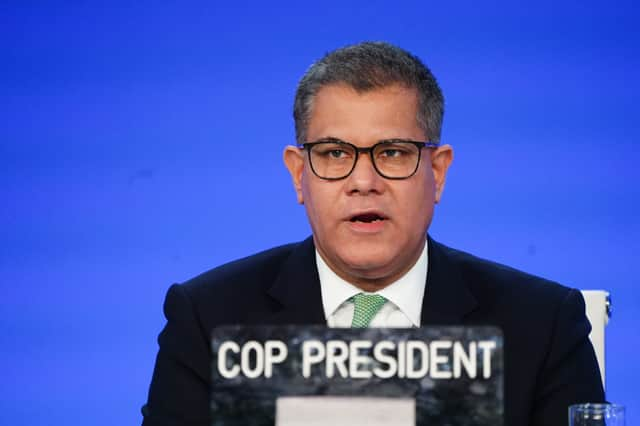What was agreed at COP26? What the Glasgow Pact says about emissions and coal
This article contains affiliate links. We may earn a small commission on items purchased through this article, but that does not affect our editorial judgement.


After two weeks of negotiations, the delegates at the COP26 summit came to an agreement on the wording of the Glasgow pact on Saturday night (13 November), one day after the official finishing time of the conference.
The deal will strengthen countries’ emissions-cutting targets for 2030 by the end of next year in a bid to limit dangerous warming - but the decision to change the wording from “phase out” to “phase down” unabated coal use following a last minute push by China and India has received sharp criticism.
What was agreed in the Glasgow Pact?
Advertisement
Hide AdAdvertisement
Hide AdWhile the Glasgow Pact was watered down at the last minute, prompting angry responses from European and vulnerable countries, it is the first explicit mention of fossil fuels in a UN climate agreement.
The deal aims to keep limiting global warming to 1.5C above pre-industrial levels “alive” or within reach, in the face of a huge gap between the action countries are taking and what is needed to meet the goal.
In the wake of the “Glasgow Pact” being gavelled through – more than 24 hours after the official finishing time of the conference, there were warnings that the 1.5C goal was “on life support”.
The final deal also commits more funding for developing countries to help them adapt to climate impacts, but the pledges don't go far enough to limit temperature rise to 1.5C.
Advertisement
Hide AdAdvertisement
Hide AdThe deal also outlines that countries have promised to meet next year to pledge further major carbon cuts.


What did Alok Sharma say?
A visibly emotional Alok Sharma, the president of COP26 who had been hurrying between negotiating teams in the final hours of negotiations, said he was “deeply sorry” for the way that events had unfolded.
He added: “I also understand the deep disappointment, but as I think that you have noted, it’s also vital that we protect this package.”
He then appeared to choke up, as the delegates in the room broke into applause.
How has the deal been received?
Advertisement
Hide AdAdvertisement
Hide AdMany island states, including the representative for Fiji, criticised the proposed change to call on parties to “phase-down” rather than “phase-out” coal.
He said: “What we would like to express was not just our astonishment but our immense disappointment in the manner in which this has been introduced.”


EU Executive vice president Frans Timmermans said he was “disappointed” that the language on coal had been diluted.
“It is no secret to this gathering that the European Union would have wanted to go even further than the initial text in the cover agreement on coal,” he said.
Advertisement
Hide AdAdvertisement
Hide AdHe continued: “This is a consequence of our own painful experience with coal. We all know that European wealth was built on coal.
UN secretary general Antonio Guterres said the approved texts from Cop26 were a compromise that took important steps, but the “collective political will was not enough to overcome some deep contradictions”.
He warned: “Our fragile planet is hanging by a thread. We are still knocking on the door of climate catastrophe.”
Labour leader Sir Keir Starmer said of the agreement: “There has been modest progress toward the challenges we face – which is important.
Advertisement
Hide AdAdvertisement
Hide Ad“But we have seen too many promises for tomorrow, not the action that the climate emergency demands today. Boris Johnson bears some responsibility for that.
“Glasgow has been a missed opportunity – a summit too often of climate delay not climate delivery”.
Scotland’s First Minister Nicola Sturgeon said: “The Glasgow Climate Pact does not contain everything that every country wanted and there is understandable disappointment that key issues were watered down in the final hours, but there can be no doubt that the Glasgow summit has made progress on some important issues.
“The importance of capping temperature increases at 1.5 degrees is no longer questioned and the need for countries to come back next year with higher contributions to tackling emissions may just be enough to keep 1.5 alive – if countries including Scotland really do deliver on our commitments.
A message from the editor:
Advertisement
Hide AdAdvertisement
Hide AdThank you for reading. NationalWorld is a new national news brand, produced by a team of journalists, editors, video producers and designers who live and work across the UK. Find out more about who’s who in the team, and our editorial values. We want to start a community among our readers, so please follow us on Facebook, Twitter and Instagram, and keep the conversation going. You can also sign up to our email newsletters and get a curated selection of our best reads to your inbox every day.
Comment Guidelines
National World encourages reader discussion on our stories. User feedback, insights and back-and-forth exchanges add a rich layer of context to reporting. Please review our Community Guidelines before commenting.
